|
|
|
Sort Order |
|
|
|
Items / Page
|
|
|
|
|
|
|
| Srl | Item |
| 1 |
ID:
133528
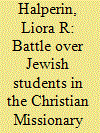

|
|
|
|
|
| Publication |
2014.
|
| Summary/Abstract |
Studies of Jewish students in Palestine's Christian missionary schools largely end at the close of the Ottoman period. But although a tiny and diminishing fraction of Jewish students studied in such schools after the First World War, the mandate period was marked by anxious and often zealous Zionist anti-missionary campaigns. The article considers this space of Jewish-Christian interaction, arguing that even as a Hebrew-dominant society took root, missionary schools provided education in European languages, particularly English, tools that offered advantages to Jewish students with an interest in clerical work or foreign study. The continuing appeal and importance of foreign language skills cast doubt on the Zionist pretence of a self-sufficient Hebrew society.
|
|
|
|
|
|
|
|
|
|
|
|
|
|
|
|
| 2 |
ID:
133533
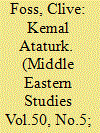

|
|
|
|
|
| Publication |
2014.
|
| Summary/Abstract |
Kemal Atatürk wanted to break with the past by providing his new nation with a new history that would give the Turks pride by showing that they were an ancient and civilized nation. The textbook produced under his personal supervision presented the Turks as central to the development of virtually all ancient civilizations. This became an official doctrine promulgated in historical congresses and many publications. It drew heavily on European writers, among them Gobineau and H.G. Wells. Although presented as a novel achievement, the new history had its roots in the recent Turkish past whose ideas were given a coherent form by Atatürk.
|
|
|
|
|
|
|
|
|
|
|
|
|
|
|
|
| 3 |
ID:
133526
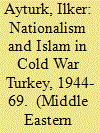

|
|
|
|
|
| Publication |
2014.
|
| Summary/Abstract |
Our current knowledge on the history of Turkish nationalism during the Cold War is a blend of facts and myths. One of those myths is the argument that the Turks developed a special relationship with Islam following their massive conversion in the eleventh century to the extent that religion has become the most important ingredient in Turkish national identity over time, even more pronounced than ethnic attributes. Secular visions of Turkish nationalism, on the other hand, which emphasize ethnic characteristics, are generally regarded as curious but unimportant exceptions. This article challenges that narrative and maintains that the alleged unimportance of secular nationalism is an invention of the late 1960s. It provides evidence that there was no consensus among Turkish nationalists on the question of Islam; on the contrary, the role of Islam in the making of Turkish identity was the most hotly debated topic among rival nationalist circles. It was not until the turning point in 1969 that a host of factors such as demographic change, anti-Kemalist and anti-RPP sentiments, and electoral behaviour in Cold War Turkey convinced Turkish nationalists to adopt a more Islamic-leaning discourse to be more successful at the ballot box.
|
|
|
|
|
|
|
|
|
|
|
|
|
|
|
|
| 4 |
ID:
133527
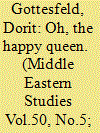

|
|
|
|
|
| Publication |
2014.
|
| Summary/Abstract |
This article examines the writing of ?uz?mah ?ab?yib, a new generation Palestinian writer, who is considered one of the foremost Palestinian women writers. It focuses on her novel Qabl an tan?m al-malikah, which serves as an example of the bold and dissident writing of the new generation of Palestinian women writers. The article examines the way in which ?ab?yib creates a feminization of humour and a kind of a 'feminine humour'. ?ab?yib employs humour in order to shed light on the darkness of life and show how despite everything and in spite of an arduous and troubled life, women know how to enjoy the small and everyday things in life.
|
|
|
|
|
|
|
|
|
|
|
|
|
|
|
|
| 5 |
ID:
133530
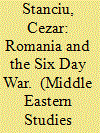

|
|
|
|
|
| Publication |
2014.
|
| Summary/Abstract |
In June 1967, when the Soviet Union and its Warsaw Pact partners decided to break off diplomatic relations with Israel following the outbreak of the Six Day War, it came as a surprise to many that Romania refused to do the same. This paper investigates previously unpublished documents in order to retrace the decision-making process in Bucharest and offer a rational answer to the question: why did Romania choose to ignore Moscow's decision? Was it a demonstration of support for Israel as it appeared at the time and, if so, what were the reasons behind it? Archival insight demonstrates that Romania's decision to maintain diplomatic relations with Israel can best be understood in the general framework of its relations with Moscow. Striving to gain autonomy in the Communist bloc and fight off Soviet domination, Romanian decision-makers preferred to engage in their own analysis of the events in the Middle East before assuming one decision or another. Their conclusions led them to believe that Moscow's policy had been adventurous and to break relations with Israel would have implied confirmation and reinforcement of Moscow's role in the Middle East.
|
|
|
|
|
|
|
|
|
|
|
|
|
|
|
|
| 6 |
ID:
133532
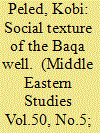

|
|
|
|
|
| Publication |
2014.
|
| Summary/Abstract |
Water sources have always played a significant role in Palestinian rural life. Springs and wells are frequently depicted in orientalist sources, yet they have barely been studied from the perspective of oral history. This article explores the social texture of an ancient well, located in the Palestinian Arab town of Baqa al-Gharbiyya in Israel, by using fragmented memories of the old women and men who drew water from that well more than half a century ago. This study examines the well as a powerful reservoir of local memories, focusing on the feminine experience that was formed at the well, on its symbolic meaning in the lives of Palestinian women, and on a silent language of implicit expressions that was once used at the well.
|
|
|
|
|
|
|
|
|
|
|
|
|
|
|
|
| 7 |
ID:
133529
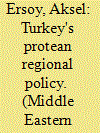

|
|
|
|
|
| Publication |
2014.
|
| Summary/Abstract |
How has regional planning been transformed in increasingly changing socio-economic and political contexts in transition economies? Why do regional planning policies and practices change? This paper explains how the policy ideas of regional development have been formulated and incorporated into the Turkish context since the establishment of modern-day Turkey in 1923. The transformation process shows how, in one way or another, policy ideas have been brought into or appeared in Turkey to shape regional policy. It emphasizes that this sort of acquisition of thinking has been translated into policy frameworks. In other words, Turkey has been taking on policies that have been devised using ideas from outside Turkey which are being dominated by growth-oriented strategies that represent a neoliberal political agenda.
|
|
|
|
|
|
|
|
|
|
|
|
|
|
|
|
| 8 |
ID:
133531
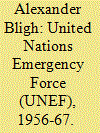

|
|
|
|
|
| Publication |
2014.
|
| Summary/Abstract |
With the conclusion of almost every round of hostilities between Israel and one of its neighbours the idea of international forces is being raised once again. This is basically an improved and revised initiative for stationing international forces to supervise (and perhaps impose) a ceasefire between the parties. In the Arab-Israeli framework, it is in essence the old approach which has been in service since 1948. Only one force, UNEF, stands out as not having been approved by the Security Council and clearly failing its intended but vaguely defined mission. The current analysis leads to the conclusion that in this particular regional conflict, the positioning of international forces must always come within the context of a more comprehensive settlement. That way, by violating a force's mandate, each party would lose either land or diplomatic recognition. Moreover, if a Middle Eastern peacekeeping operation is to take place in the future, it has to include organic units of the warring parties, encouraging peaceful interactions. Such units should reinforce organic units from countries acceptable to all parties. Hopefully, future missions, taking into consideration some of the approaches suggested here, can continue to contribute to regional processes for peace.
|
|
|
|
|
|
|
|
|
|
|
|
|
|
|
|
|
|
|
|
|